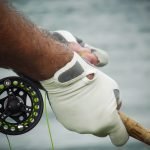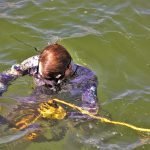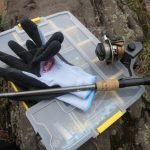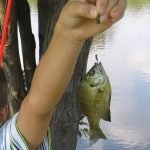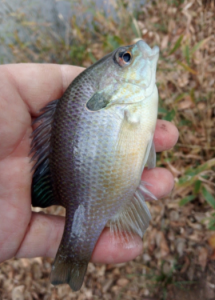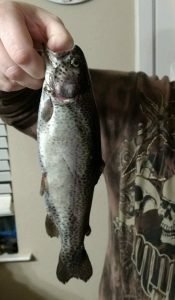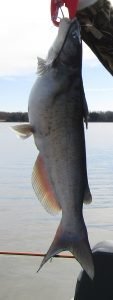There is a bit of a debate these days over the appropriateness of wearing gloves while fishing. New female anglers often ask their social groups about these fishing gloves (types, uses, availability) only to be degraded and belittled for even suggesting gloves be used. I’ve even been told by some women that they’re considering not continuing to fish over how callously they were treated for asking about fishing gloves.
- Fly Fishing
- Puncture Resistant
- Rubber
- Padded
Why such a debate over gloves?
Many anglers, especially the men who have been fishing generation after generation, have been indoctrinated to the idea that gloves in fishing symbolize weakness. Many of them talk about how it’s necessary to feel the fish completely or you’re not “actually” fishing. Then there’s the alternative argument that gloves are more likely to injury the fish when you handle them. In actuality, they are no more likely to injure a fish than irresponsible handling with bare hands. If your intent is to release the fish, there are safety precautions that can and should be taken. If your intent is to keep the fish (trophy or food), injury is inevitable when you dispatch the animal. For a complete breakdown of the safe practices for handling a fish you intend to release, check out the article by Boundary Waters.
The reality is, actually, rather in depth.
There are about as many reasons for wearing gloves as there are fish in the water. When you are learning to fish there are significant issues that have to be learned and addressed. Fishing gloves or bare hands, the need for responsible handling is going to be (ultimately) the same. Focusing on the single issue of a gloved hand vs a bare hand touching the fish is actually a minor category in the entire process of fishing.
- Handling is less of a concern when keeping your fish
- limited contact helps protect the “slime” coating
- Grippers can help limit injury, with or without gloves
- When the fish is lip hooked, they may not have to be handled at all
Check out The three rules for Becoming a Successful Angler to get a breakdown of what learning to fish entails.
Successfully hooking a fish, safely landing your catch, knowing how to appropriately release the fish that aren’t of legal-size or species… These are defining aspects of the learning to fish dilemma. These are the subjects that will make for great fishing adventures or cause your quest to fall short. Gloves, on the other hand (yes, pun intended) are merely a means to an end when it comes to selecting your choice of tools.
There are more options for types and styles of gloves than you may realize. Each pair has a reason for use and serves a very important purpose. Consider the options and opportunities gloves can provide for you. Gearweare breaks down these options rather succinctly.
Knowing the species of fish in your chosen fishery leads to a whole list of “need to know” categories. Small stocked trout and panfish are going to require small hooks, a gentler hook set, and a quicker release than some of the larger, hardier fish. That is unless you’re keeping the fish, in which case you’ll need to know legal counts and sizes, humane ways to dispatch the fish once you’ve caught them, and how to clean them for eating.
Be sure to subscribe to our YouTube channel so you can get notices when our planned fish cleaning videos go active.
How do fishing gloves enter into the fishing equation?
The most common myths I hear are:
If you wear gloves you’re afraid to touch fish.
Fear has nothing to do with the reality of fishing. Simply by trying to learn to fish you have overcome the biggest fear of the adventure. Gloves can protect hands from natural substances that may cause reactions. Certain conditions can cause grip, sensation, and motion concerns that gloves will help minimize. When learning to fish you have to manipulate your environment to find methods that work for you so that your skills can develop and flourish. Rather than looking at gloves as hiding from fear, realize gloves can be a tool to help you. The Golden Rule of Fishing discusses this in-depth.
Wearing gloves prevent you from experiencing the catch.
The rush of excitement hits when that bite first strikes. The fight between angler and fish grows as the line shrinks bringing angler and fish closer together. The purest sense of accomplishment hits when the angler defeats the fish but landing it (on land or in a boat). Removing the hook and returning it to the water or putting it in your choice of containment devices is simply a formality once the challenge is over.
Fish are injured by the gloves when the angler wiped the fishes protective coating off.
It truly doesn’t matter if you wear gloves or use your bare hand when you are handling a fish. Both can remove the coating on your catches skin. Both can damage scales should you hold the fish incorrectly. Neither will be the cause of the fish’s demise if the fish is handled correctly. Every tool can be used correctly or incorrectly. As a responsible angler, it is your job to learn to use your tools correctly. As a budding adventurer, it is your right to use the tools that help you gain the skills and confidence you need to become successful.
Take it or leave it…Or Make it Your Own!
AJ never wears gloves when she fishes. She has a pair, she just never puts them on while we’re fishing. I, on the other hand, always wear my gloves. When you see me holding a fish in my photos you’ll notice that I hold my catch by the lip and either the tail or a couple of fingers under the stomach. The physical contact with the fish’s protective coating is limited this way. I also wear fingerless gloves. While it is not as good for improving my grip it is what I have found works best for my combination of needs. This is part of why I have learned how to more correctly handle my catches so that I can return the fish I do not intend to harvest.
More importantly, my gloves serve a significant service for me.
I have limited sensation in my hands complicated by reduced grip strength. Gloves give me an incredible advantage. They allow me to keep a more secure grip on my rod, help keep my reeling consistent and steady, and protect my hands from injuries I don’t tend to feel as they occur. I talk about the need for accommodating limitations, such as the ones AJ and I deal with on our adventures in Disabled not Unable. Check it out.

Now, yes, they have helped with limiting getting stabbed by spines (especially the catfish I so frequently target) but, more importantly, they protect me from things happening on the bank. I have had instances where I have embedded hooks deeper than would happen if I could have felt what was happening. There have been times that I set the hook a bit too harshly and found my hands in the grasp of thorny bushes. The gloves protected my skin incredibly well from those merciless thorns.
Touching a fish is the least of your “concerns” when fishing when it comes to the question of whether or not you should wear gloves.
When you’re ready to learn to fish you need every advantage you can get. If gloves are something you want or need to achieve that advantage, then go for it. If you try gloves and don’t like them, quit using them. But, if you don’t feel you need them or want them, that’s perfectly fine too. Ultimately, don’t let naysayers, bullies, or territorial individuals intimate you into doing something you’re not ready or comfortable with doing.

Fishing is an independent and relaxing activity. Letting people force you into something you feel is uncomfortable will not make fishing enjoyable for you. Fishing is your escape from the sometimes intimidating, occasionally overbearing, and once in a while judgmental world. Don’t let the opinions of others dictate your choice of fishing gloves.

